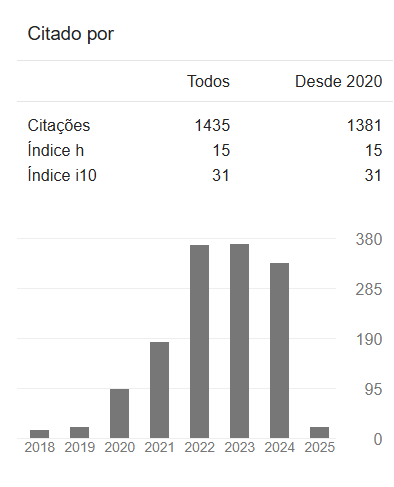USE OF DIGITAL GAMES AS DIDACTIC-PEDAGOGICAL STRATEGY: AN EXPERIENCE WITH HIGH SCHOOL STUDENTS IN THE DISCIPLINE OF BIOLOGY
DOI:
10.23926/RPD.2526-2149.2019.v4.n1.p255-274.id429Keywords:
Biology, technology, games, teaching, learningAbstract
The study aims to construct games using the programming language Scratch, from the problematization and doubts of the students in the discipline of Biology. The survey involved students in the second year of high school. Two workshops were held in the IFMT campus Alta Floresta computer lab so students could build digital games. For the analysis of the data were considered the records of the workshop of presentation and setting in the language and a questionnaire as an instrument of evaluation of the activity. From the initial expectations, it is assumed that the present work has brought an important experience to reaffirm the need for a modified teaching since the possibilities of learning by the interest and motivation in the construction of the games using technologies of the information in the communication that provided the control and autonomy in the learning process.
Downloads
Metrics
References
ALVES, Lynn. Relações entre os jogos digitais e aprendizagem: delineando percurso. Portugal, EFT - Educação, Formação & Tecnologias, v. 1, n. 2, p. 3-10, nov. 2008. Disponível em: <http://eft.educom.pt/index.php/eft/article/view/58/38>. Acesso em: 28 mar. 2018.
BATTAIOLA, André Luiz. Jogos por computador – histórico, relevância tecnológica e mercadológica, tendências e técnicas de implementação. In: Anais da XIX Jornada de Atualização de Informática, SBC. 2000. v. 2, p. 83-122.
COLL, Cesar; MONEREO, Carlos. Educação e Aprendizagem no século XXI. Novas ferramentas, novos cenários, novas finalidades. In: COLL, César. Psicologia da educação virtual: aprender e ensinar com as tecnologias da informação e da comunicação. Porto Alegre: Artmed, 2010. p. 15-46.
Como entra a cultura digital na escola. 2011. Produzido por educarede. . Disponível em: https://www.youtube.com/watch?v=EAITZRF10bk&list=PL4E1B0B746C0C854D>. vídeo (3min51s). Acesso em: 27 jun. 2017.
DEMO, Pedro. Educação Hoje: “Novas” tecnologias, pressões e oportunidades. São Paulo: Atlas, 2009.
FAGUNDES, Lea da Cruz; MAÇADA, Débora Laurino; SATO, Luciane Sayuri; Aprendizes do futuro, as inovações começaram. Brasília: MEC, 1999. Disponível em: <http://www.dominiopublico.gov.br/download/texto/me003153.pdf>. Acesso em: 4 mar. 2017.
FALKENBACH, Gilse A. Morgental. O lúdico e os jogos educacionais. CINTED-UFRGS. Novas Tecnologias na Educação. 2006. Disponível em: <http://penta3.ufrgs.br/midiasedu/modulo13/etapa1/leituras/arquivos/Leitura_1.pdf>. Acesso em: 1o jun. 2018.
HUIZINGA, Johan. Homo Ludens. 4.ed. São Paulo: Perspectiva, 2000.
Disponível em: <http://jnsilva.ludicum.org/Huizinga_HomoLudens.pdf>. Acesso em: 10 jun. 2018.
JUUL, Jesper. A clash between game and narrative. DAC Conference, Bergen, Norway, 1998. Disponível em: <https://www.jesperjuul.net/text/clash_between_game_and_narrative.html>. Acesso em: 18 jun. 2018.
LALUEZA, José Luis; CAMPS, Isabel Crespo e Silva. As tecnologias da informação e da comunicação e os processos do desenvolvimento e socialização. In: COLL, César. Psicologia da educação virtual: aprender e ensinar com as tecnologias da informação e da comunicação. Porto Alegre: Artmed, 2010. p. 47-65.
LUCCHESE, Fabiano; RIBEIRO, Bruno. Conceituação de jogos digitais. São Paulo, 2009. Disponível em: . Acesso em: 10 jun. 2018.
MATURANA, Humberto. O que é educar? 1995. Disponível em <http://www.dhnet.org.br/direitos/direitosglobais/paradigmas/maturana/oqueeducar.html>. Acesso em: 7 dez. 2017.
MATURANA, Humberto; DÁVILA, Ximena Paz. Desde la matriz biológica de la existencia humana. Revista PReLac, v. 2, p. 30-39, 2006. Disponível em <http://unesdoc.unesco.org/images/0014/001455/145502por.pdf#145872>. Acesso em: 7 jul. 2018.
PRENSKY, Marc. Digital Native, digital immmigrants. Digital Native immigrants. On the horizon, MCB University Press, Vol. 9, N.5, October, 2001. Disponível em:< http://www.marcprensky.com/writing/Prensky%20-%20Digital%20Natives,%20Digital%20Immigrants%20-%20Part1.pdf> . Acesso em: 1 jul. de 2019. DOI: https://doi.org/10.1108/10748120110424816
PRENSKY, Marc. Digital game-based learning. Computers in Entertainment (CIE), v. 1, n. 1, p. 21-21, 2003 DOI: https://doi.org/10.1145/950566.950596
SANTOS, Jordan Wellington Rodrigues; SILVA, Meyriele Ribeiro da; BENASSI, Vivian Machado; AMARAL, Heber Fernandes. BIOQUIZ: JOGO ELETRÔNICO DE BIOLOGIA PARA O ENSINO MÉDIO. Revista UFG, v. 15, n. 16, 2015. Disponível em: <https://www.revistas.ufg.br/revistaufg/article/view/48532>. Acesso em: 29 maio 2018.
SAVI, Rafael; WANGENHEIM, Cristiane Greese Von; ULBRICHT, Vania; VANZIN, Tarcisio. Proposta de um modelo de avaliação de jogos educacionais. RENOTE- Novas Tecnologias na Educação, Porto Alegre, v. 8, n. 3, 2010. Disponível em < https://www.seer.ufrgs.br/renote/article/view/18043/10630>. Acesso em: 29 jun. 2019. DOI: https://doi.org/10.22456/1679-1916.18043
SILVA, Luciana Aparecida Siqueira; FARIA, Joana Cristina Neves de Menezes. Quiz” da membrana plasmática–construção e avaliação de material didático interativo. Enciclopédia Biosfera, p. 2204-2218, 2012. Disponível em: <http://www.conhecer.org.br/enciclop/2012b/ciencias%20humanas/quiz.pdf>. Acesso em: 29 mai. 2018.
TAROUCO, Liane Margarida Rockenbach; ROLAND, Letícia Coelho; FABRE, Marie-Christine Julie Mascarenhas; KONRATH, Mary Lúcia Pedroso. Jogos educacionais. RENOTE - Novas Tecnologias na Educação, Porto Alegre, v. 2, n. 1, p. 1-7, mar. 2004. Disponível em <https://seer.ufrgs.br/renote/article/view/13719/8049>. Acesso em: 29 maio 2018. DOI: https://doi.org/10.22456/1679-1916.13719
Downloads
Published
How to Cite
Issue
Section
License
Copyright (c) 2023 A Revista Prática Docente tem o direito de primeira publicação

This work is licensed under a Creative Commons Attribution-NonCommercial 4.0 International License.
Authors who publish in this journal agree to the following terms:
- Authors retain the copyright and grant the journal the right of first publication, with the paper simultaneously licensed under the Licença Creative Commons Attribution allows the sharing of the work with acknowledgment of authorship and initial publication in this journal.
- Authors are authorized to take additional contracts separately, for non-exclusive distribution of the version of the work published in this journal (e.g. publish in institutional repository or as a book chapter), with acknowledgment of authorship and initial publication in this journal.











